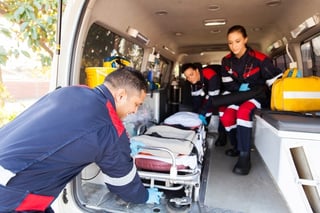 As an emergency care provider, you will occasionally find patients who refuse transport. A Utah study showed that 5.1% of patients refused transportation against direct medical advice of EMS. A common reason to refuse transport is concerns about cost. Many patients also may feel that their injury is not severe enough to warrant an ambulance ride.
As an emergency care provider, you will occasionally find patients who refuse transport. A Utah study showed that 5.1% of patients refused transportation against direct medical advice of EMS. A common reason to refuse transport is concerns about cost. Many patients also may feel that their injury is not severe enough to warrant an ambulance ride.
When Can a Patient Refuse Transport?
While EMS will try to honor a patient's preference and allow him or her to seek medical attention privately, sometimes it is the legal and moral duty of the on-scene EMS to transport a patient without their consent. Whether or not a patient's request can be honored is based on two primary factors:
- The capacity to consent
- The age of the patient
Minors are not allowed to refuse medical care. Patients who are unconscious, or show altered consciousness and judgment may also be transported without consent. Most other patients have the right to refuse. Many of these refusals are not because the patients do not want care, but because they are intimidated by the cost.
How Can Administrators Prepare?
What can administrators include in their emergency preparedness plan to help these patients? How can first responders support and treat them in the best manner and enable them to get to the emergency department on their own? Once you consult your legal representative and administrative policy statements, consider putting the following into your patient transport protocol:
- Explain the injury to your patient and the standard treatment protocol.
- Provide them with a list of symptoms that indicate the need for immediate intervention (not waiting until normal office hours).
- Provide the patient with additional supplies -- a blanket if they are cold, extra bandages for a wound, ice packs. Offer as much supportive care as the patient will allow.
- Clearly, explain the local legal statutes regarding refusal of service, if any.
In addition, you may want to have the patient sign a Refusal of Treatment form.
Graham Medical specializes in single-use EMS supplies including treatment kits (drapes and protective surfaces), sheets, pillows, blankets, and portable carriers. We can also help administrators select personal protective equipment for your staff. When deciding which supplies to stock for your EMS agency, the emergency preparedness experts at Graham can help you choose the best products to fit your patient needs. Get expert advice from Graham Medical online.

